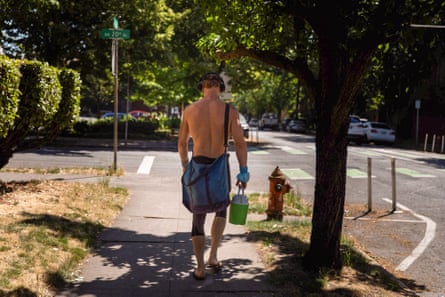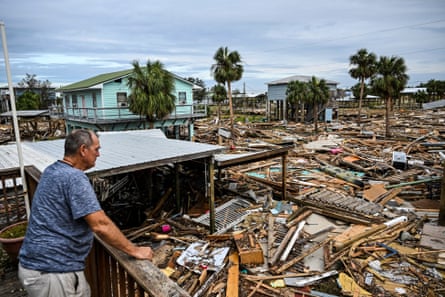Climatologist Friederike Otto: ‘The more unequal the society is, the more severe the climate disaster’
Climatologist Friederike Otto: ‘The more unequal the society is, the more severe the climate disaster’
Friederike Otto is a senior lecturer in climate science at Imperial College London. She is also the co-founder of the World Weather Attribution initiative, which seeks to determine the influence of global warming on intensity and likelihood of an extreme weather event. The project also examines how factors such as ill-suited architecture and poverty exacerbate heatwaves, hurricanes, floods and wildfires. This is the theme of her second book, Climate Injustice: Why We Need to Fight Global Inequality to Combat Climate Change.
The thesis of your book is that the climate crisis is a symptom of global inequality and injustice. That will be quite topsy-turvy to some people, who think global heating is caused by the amount of carbon that we are putting into the atmosphere.
Yes, of course, if you just stick to the physics, then the warming is caused by the amount of carbon in the atmosphere, but the amount of carbon in the atmosphere is caused by the burning of fossil fuels. And it is also the case that those who benefit from the burning of fossil fuels are the few already wealthy people who have stakes in or own the companies themselves. The vast majority of people do not benefit. The American dream is social mobility, not burning fossil fuels.
You are arguing that racism, colonialism and sexism all underpin global heating. Tackling those things seems more challenging than a technical solution for the climate crisis.
Of course it’s more challenging than just inventing some stuff. But we have solar and other renewable sources of energy and this isn’t solving the problem. The problem will only be solved if we address the underlying causes. I argue those are the inequalities in our society.
Some would say those kind of statements are political, and scientists should stick to the science.
The idea of writing this book came through my work because every time we do a study, we look at what the role of climate change is in the weather event that ultimately led to disasters. But we also look at what else is happening, who was affected, why were they affected. I would say in all cases, what turns weather into a disaster is not how much it rained but how vulnerable people are and how well prepared. Therefore, depending on which type of weather event we are looking at and where in the world we are, we always find that the more unequal the society is, be that a US city or a state in western Africa, the more severe the consequences.
 View image in fullscreenA man carrying a jug of water during the 2021 heatwave in Portland, Oregon. Photograph: Bloomberg/Getty Images
View image in fullscreenA man carrying a jug of water during the 2021 heatwave in Portland, Oregon. Photograph: Bloomberg/Getty ImagesThe relationship between the extraction of fossil fuels and colonialism and racism seems clear, but can you explain how sexism intersects with global heating?
In all the studies we have done, we have found that the more patriarchal the structures in a society, the worse the consequences of climate change are. If women are excluded from decision-making and don’t have access to finance, many more people die and lose their livelihoods in extreme weather.
Why do you find the term natural disaster misleading?
There are natural hazards, although because of climate change, they’re also becoming quite unnatural in some instances. But whether it turns into a disaster has very little to do with nature and a lot to do with social vulnerability.
Is the Cop [UN climate summit] process fit for purpose? It seems to be more about maintaining the status quo.
It is definitely not fit for purpose because it’s not achieving what we need: faster change and change that would really benefit the majority of the people and not just the very few. But it’s not the fault of the Cop process. It has actually achieved quite a lot because if we hadn’t had this conversation, we would be on track to a four- or five-degree [warmer] world. We are now on track to a three-degree world, which is still a world we absolutely do not want to live in. But it is thanks to the Cop process that we talk about climate change on an international global level. The Paris agreement states that we care about climate change because it violates human rights and we want to do something about it. That is a major achievement. What we have to do now is not to say: “Oh it’s all shit, let’s abandon it all.” But how can we make these institutions stronger because they can serve us well and we need them.
Do individuals bear responsibility too? Politicians, businesspeople, even scientists?
The process – as in the institutions, Cop, international justice etc – is great, but it can only work if all individuals support it. At the moment we see that many try to dismantle them, all of us have a duty to fight for them, policymakers, scientists etc. Without these institutions there will be no prosperity.
You write about the Pacific north-west heatwave of 2021, which caused more than 1,000 deaths and had enormous economic impact. Does it concern you that tragic events like this don’t appear to be wake-up calls?
We do need wake-up calls, but we need more than that. Without having an idea of what to do, they won’t suffice. But we have learned some things from these events. For example, the biggest difference in every extreme event for the death toll is whether there are functioning early warning systems or not. We saw this with Hurricane Helene: in Florida people are used to hurricanes and are aware that if there is a forecast that says evacuate, you have to evacuate. But a bit further north in the Appalachians, [where] people are less used to it, they didn’t. Plus there was a lot of disinformation and the FEMA [Federal Emergency Management Agency] was attacked for trying to help people. So the death toll was much higher.
 View image in fullscreenDamage in Florida caused by Hurricane Helene. Photograph: Chandan Khanna/AFP/Getty Images
View image in fullscreenDamage in Florida caused by Hurricane Helene. Photograph: Chandan Khanna/AFP/Getty ImagesOne Republican congresswoman suggested that the US government created the hurricane.
The fact that you can say that and probably half the people who would listen to you would think: “Yeah, why not?” That’s a big issue. I don’t know how to solve the “facts don’t matter any more” problem.
Calling those people climate-crisis deniers seems inadequate.
The more incredible the lie, the better it sticks. We have so many lines of evidence and so much data and it all shows the same thing. By questioning the data, you can’t create arguments that climate change isn’t happening. So I guess the fact-free approach is actually the result of the success of science.
You described the Pacific north-west heatwave as being “mathematically impossible”; that it was so rare that it could only happen once in 100,000 years.
Yes, if you don’t take climate science into account. Once you take global warming into account, it goes from being outside everything you would expect from a normal statistical assessment to 1 in 100 or 200.
And those odds are shortening?
Yes, very much so. So in a two-degree world you would expect to see this once every five years or so.
Earlier this month a board member of global insurer Allianz SE noted that we are on track for a rise of 2.2C and 3.4C above preindustrial levels. He said a rise of 3C would render many regions uninsurable and make investment too uncertain – ultimately capitalism would cease to be viable. Does that ring true to you?
It’s interesting to hear it in such terms from an insurer. Capitalism as we know it now would be unviable. We are on track to tear it down by accident.
댓글
댓글 쓰기